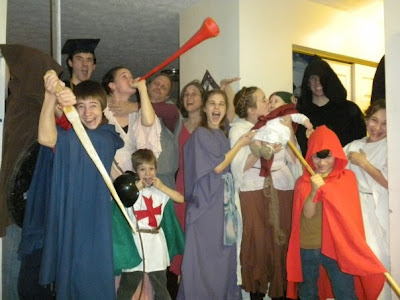All in All: Homeschool Pros and Cons, Part III
 |
| Our crazy bunch during a rambunctious Medieval Feast a few years ago |
“Mom,
no one mentioned how much fun homeschooling is!” Kara and I were
leaving church after a Saturday seminar on educating children. In the
final session Tim had led a discussion of the pros and cons of the
various schooling options, and in an effort at even-handedness, he'd
been careful not to push the positives of home education. As a
homeschool graduate, and a mother planning to teach her children at
home, Kara was dismayed that this pleasant perk, one felt by both
students and teachers, had been overlooked.
Well,
it is true.
Pro #3: Homeschooling can be enormously fun for both the children and for the teaching parents.
Sometimes this fun comes from the big deals like Medieval Feasts or building a teepee or dissecting cow eyeballs. But when I talk about learning as fun, I'm thinking more about how children get turned on to learning. Sometimes you'll even see their learning spill over into their free play and they'll pretend to be frontiersmen in the backyard or build polar bear dens in the basement just for fun. When you teach with real books as an anchor, incorporate real-life learning opportunities, take time to build models and dramatize history, experiment in your kitchen with science, and dig into all sorts of topics as a family, you all will find much of the work to be a genuine pleasure. And no, I don't mean that every day is a continuous field trip.
Pro #3: Homeschooling can be enormously fun for both the children and for the teaching parents.
Sometimes this fun comes from the big deals like Medieval Feasts or building a teepee or dissecting cow eyeballs. But when I talk about learning as fun, I'm thinking more about how children get turned on to learning. Sometimes you'll even see their learning spill over into their free play and they'll pretend to be frontiersmen in the backyard or build polar bear dens in the basement just for fun. When you teach with real books as an anchor, incorporate real-life learning opportunities, take time to build models and dramatize history, experiment in your kitchen with science, and dig into all sorts of topics as a family, you all will find much of the work to be a genuine pleasure. And no, I don't mean that every day is a continuous field trip.
 |
| Kara, Kristen, and baby Amanda during a unit on Ancient Rome |
Homeschooling
isn't fun only for the children, though. You remember how thrilling
it was to watch your baby stand up and take his first tentative
steps? When you homeschool, you will have the same joy in watching
your child learn to read his first words or figure out how to add
fractions. And then there is the joy of learning alongside your
children. As believers, just as Solomon spoke about the world God had
created (I Kings 4:33), we also should delight to better understand
God's works, including those revealed in nature and history. I, like
so many homeschooling moms, wasn't prepared for how rich this
experience would be. What a joy to learn things I either never knew
or have long forgotten, and then to share that knowledge with my
children!
So
now I've used that word “fun” in each of the preceding
paragraphs. And I really don't like that word. “Fun” is so
inadequate. Fun conjures up the idea of amusement, diversion, or
mirth, and that's not what I'm talking about. I'm thinking more of
rewarding, challenging, meaningful. Education doesn't need to be
entertaining to be deeply satisfying – for both students and
teachers.
Which
leads to Pro #4: Homeschooling makes it easy to develop a love of
learning!
Do
you want your children to enjoy vegetables? Growing your own and
cooking them in healthy, creative ways goes a longer way toward this
goal than does drenching them in cheese sauce or pureeing them so
they are unrecognizable. So too with learning. Yes, we can work at
teaching creatively – as time and other factors allow – but more
than that, we can help our children learn to love learning without
having lots of bells and whistles.
Some
ways to encourage a love of learning are to minimize junk-food
competitors such as TV and other forms of screen time. Read excellent
“living” books, give your children props and tools (costumes,
building materials, art supplies, and free time), and stretch them to
work beyond their current abilities; be enthusiastic yourself about
learning – but more about this in Part IV.
 |
| Toddler J enthusiastically shows his gumdrop and toothpick bridge |
Con
#3: Homeschooling is often lonely, especially for moms.
To
teach your children wholeheartedly means you will necessarily have to
say no to activities you once engaged in. Every outside activity
needs to be looked at hard to determine what can stay and what must
go for this season so you can be faithful to your children's needs.
As moms we need to die to ourselves and our desires.
One
way to counter this loneliness while homeschooling may be joining
with a few other families for co-op activities periodically. The past
two years I once again have been able to co-op with some good
friends. I can tell you the fellowship has been every bit as
important for me as for my two participating sons.
Con
#4: Fear of leaving something out
So homeschooling makes a great way to instill a love for learning.
But what about that fear that assails every homeschool mom at some
time or another: What if I leave something out?
Guess
what? You will! You are guaranteed to omit something, whether it is
something inconsequential or something significant. We didn't have
our oldest son take any computer programming classes as we'd been
told he would get everything he needed his freshman year at Purdue.
Well, it turned out everyone else (or just about) in his Freshman
Honors Engineering program had already taken at least one programming
class, and he started behind. Woe is me! I gnashed my homeschool mom teeth for about five minutes, and then I got over it.
But
you know what? It was OK. Andrew had learned how to learn, and so it
wasn't a big deal. The solution to this “Con” is to teach your
children how to learn and to instill a love for learning. You'll
never manage to teach them everything they need to know. But giving
them skills to teach themselves can go a long way in making up for
holes in their education as well as give them tools to keep growing
and developing throughout life.
Other parts of this series so far:
Pros and Cons Part I: Discipleship and Hard Work
Pros and Cons Part II: Tailored Education and Overwhelming Choices
Other parts of this series so far:
Pros and Cons Part I: Discipleship and Hard Work
Pros and Cons Part II: Tailored Education and Overwhelming Choices


Comments
I have a "practical" homeschooling question that I am wondering if you or some other moms out there might be able to answer. What is a realistic amount of money to spend/plan on spending to homeschool our children? Our oldest turns 4 this month so we really have another year before we need to start buying curriculum. However, we want to go into this with realistic expectations and budget in mind. Does it get more expensive ts children advance? Or vice versa? How much do you spend on supplies, equipment, materials, etc.? I know this is probably a really hard question to answer, but any practical insight you can give, or even tips on keeping the cost down, would be very much appreciated. Thank you, Jessica Woods
Well, I guess the best answer might be, "That depends." It depends on the type of materials you choose, whether you can find used materials, how much you reuse from one child to the next, what you include in your hs budget (music lessons?, field trip costs?), and so on.
That said, the average amount spent per child, according to a 2008 study of just under 12,000 homeschooled students, was between $400-$599 per student. *
You can definitely do it for significantly less than this, particularly in the early years. A friend of mine (and one of yours as well!) told me she spent far less than $100 for Kindergarten. You can find used curriculum at a variety of sources including used curriculum sales, Amazon, ebay and a place called Vegsource. (Look for the For Sale and Wanted to Buy swap boards.) http://vegsource.com/homeschool/
Here's an article you might find helpful: http://www.hslda.org/earlyyears/Costs.asp
Costs do increase as children grow, especially as they reach high school. That's been our experience, anyway. Books cost more, for one thing. Faith's adv. alg. math book runs $123 new or about half that for a used copy. Then she needs a graphics input tablet and a graphing calculator, both of which she will share with a sister. We use an online school for several classes in high school as well, and the tuition runs just under $500/class. So, even picking our classes judicially, this adds up. The excellent teachers and outside input have been invaluable for each of our older kids, though.
It is to your advantage that you are planning ahead! You can determine what approach you are interested in and start looking for books now. Texas has a very strong homeschool community, so I'd think you could find some good used curriculum sales. Check with local support groups to see when they do this.
Hope that helps some!
And to anyone else reading this - please jump in with your experience!
~A
* Here's a summary of the research I mentioned above:
http://www.nheri.org/research/nheri-news/homeschooling-across-america-academic-achievement-and-demographic-characteristics.html